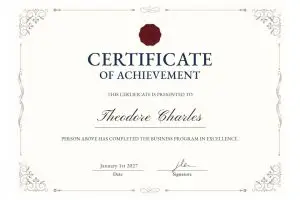Certificate programs and completion certificates are both types of educational programs that can provide valuable training and skills to individuals in a variety of fields. However, there are differences between certificate programs versus completion certificates, including the length and depth of the program, the type of certification or degree earned, and the cost. A certificate program is a structured educational program that leads to a certificate upon completion, typically covering a specific field of study. On the other hand, a certificate of completion is awarded for completing a course or training program, but it may not cover a specific area of study or have as much educational rigor as a certificate program.
Certificate Programs vs Completion Certificates
Understanding the differences between certificate programs and certificates of completion can help individuals choose the best option for their career goals and interests. This article compares certificate programs and certificates of completion, to assist individuals in deciding which option aligns best with their educational goals and professional aspirations.
| Certificate Programs | Certificates of Completion |
|---|---|
| Typically, longer, more comprehensive programs | Can vary in length and may focus on a specific skill or topic |
| Often requires completion of coursework, exams, and projects | Typically awarded upon completion of a course or workshop |
| May be offered by universities, colleges, or specialized training programs | May be offered by a variety of organizations, including universities, colleges, vocational schools, and private companies |
| May result in a degree or professional certification | Generally, do not result in a degree or professional certification |
| Designed to provide in-depth knowledge and skills in a particular field or industry | Designed to provide a basic understanding or introduction to a skill or topic |
| Can be more expensive than certificates of completion | Can be less expensive than certificate programs |
| Often require a larger time commitment | Can be completed more quickly |
| May have prerequisites or require prior education or experience | Typically, do not have prerequisites |
| May be used to advance a career or gain a promotion | May be used to demonstrate proficiency or for personal development |
| May be required for certain professions or industries | May not be required, but can be beneficial for job applications |
Choosing between Certificate Programs vs Completion Certificates
Individuals may choose between a certificate program or a completion certificate depending on their personal or professional goals. Certificate programs are often chosen by individuals seeking to gain advanced knowledge and skills in a particular field or industry and may lead to a degree or professional certification. Certificates of completion, on the other hand, may be chosen by individuals seeking to gain a basic understanding or introduction to a skill or topic, and can be completed more quickly and at a lower cost. Ultimately, the choice between a certificate program or a completion certificate depends on an individual’s specific needs and goals.

Case Studies
Case Study 1: Choosing a Certificate Program
A recent college graduate, John, was interested in pursuing a career in digital marketing. He was considering two options: a certificate program in digital marketing, offered by a reputable university, or a series of certificates of completion from various online platforms.
After researching both options, John decided to enroll in the certificate program as it provided a more comprehensive curriculum and hands-on experience. He believed that having a recognized certification from a reputable institution would provide him with a competitive advantage in the job market.

Case Study 2: Choosing Certificates of Completion
A manufacturing company was looking to improve the skills of their employees in the areas of quality control and safety. They had the option to enroll their employees in a lengthy certificate program offered by a technical school or provide them with certificates of completion for various online courses and workshops.
After careful consideration, the company decided to opt for the certificates of completion as they were more cost-effective and allowed their employees to learn at their own pace. The online courses were also tailored to specific areas of improvement, providing employees with practical knowledge and skills that could be immediately applied in their daily work.



